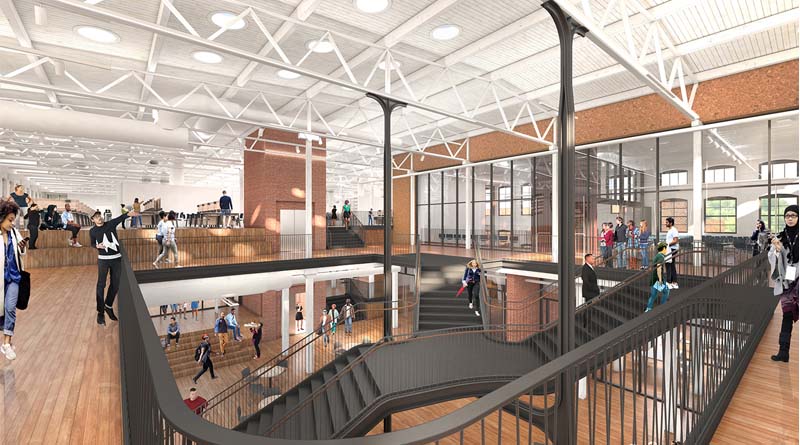University of Kentucky Plans Unique Adaptive Reuse Project
By Eric Althoff
LEXINGTON, Ky.—The University of Kentucky’s College of Design has selected the Studio Gang as designer for the Reynolds Building, an early-20th-century building that was once a tobacco warehouse, for new use by the college.
The university has had its sights set on the building for a half-century, as its convenient location will allow for the school’s design courses and studio space to grow in the years to come. Furthermore, by maintaining the historic building’s architectural motifs, students in the design school will be able to observe earlier iterations of American designs up close and personal. Its interiors and exterior will be largely kept intact as the building is repurposed for instruction in such specialties as product design, biomedical engineering and landscape architecture.
Studio Gang’s plans will be executed in concert with architect of record K. Norman Berry Associates of Louisville.
“I appreciate the cultural approach and language that Studio Gang built into the project,” College of Design Dean Mitzi Vernon said in a recent statement. “We move now from thinly linked monocultures to a polycultural environment and an adaptive reuse opus that symbolizes the sustainable future for which we must advocate.”
“At a time when it is essential to conserve resources and decarbonize, the work of reinventing existing buildings to serve new purposes has never been more critical,” said Jeanne Gang, FAIA, Studio Gang founding partner. “The Reynolds project demonstrates this idea, and takes it beyond environmental necessity, showing how reuse can also be a satisfying, creative act of design and making.”
Rather than redesigning the building from scratch, the redesign will take advantage of the structure’s unique layout to allow for open floor plates and a “repetitive structural grid,” which allows for greater interaction of students, instructors and staff in a more freeform environment. This will increase opportunities for collaboration and experimentation, officials say.
The open studio spaces will make use of the building’s timber column grid to allow for separate studio spaces, which will be complemented by pin-up walls and various other design elements that will be fashioned by students themselves.
And on the building’s exterior, a large fabrication dock will provide public space for the display of large-school projects that can be shared with the community. Landscaping and planting of trees will make for a more integrated-with-nature environment as well.
“KNBA has been a champion of the CoD for over 50 years, beginning with partner emeritus Norman Berry as a member of the inaugural graduating class of 1965,” said Bob Haffermann, managing principal of K Norman Berry Associate Architects, adding that his firm employs many UK graduates. “The renovation of the Reynolds Building for the CoD continues a firm legacy of technical expertise combined with sensitive rehabilitation of structures that contributes to our collective cultural, educational, aesthetic and inspirational legacies — all of the things that quite literally make us who we are.”
Added Vernon, the college’s dean: “This move to the former Reynolds Building allows the college to build a sustainable and innovative atmosphere for the evolution of design education and future generations of students while providing us the room to grow in both scope and size.”

